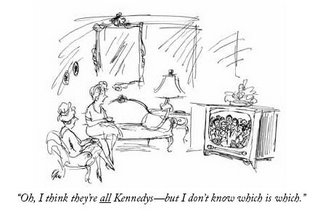 Artist: Everett Opie Published: The New Yorker July 3, 1960
Artist: Everett Opie Published: The New Yorker July 3, 1960When I wore half khakis to school, JFK's photo was ubiquitous in small town of Maharashtra. It used to hanged in esteemed company of Nehru, Gandhi, Subhash Chandra Bose, Rana Pratap, Shivaji et al. I still remember seeing this pantheon on the wall of a small neighbourhood restaurant.
Over the years, JFK has been unmasked. He has been pushed down from his pedestal like a Lenin. For my back, reading Gore Vidal's review of Seymour Hersh's book- The Dark Side of Camelot- was the final straw.
Now, I don't want to know which is which Kennedy.
I think similar fate awaits most of India's most prominent political families. Although I must say reputation of Nehru has fared much better than JFK after his death.
No comments:
Post a Comment